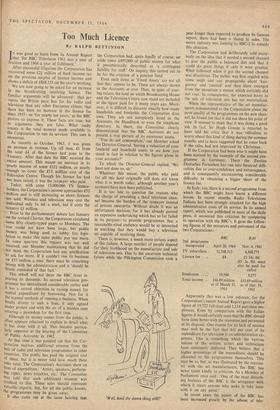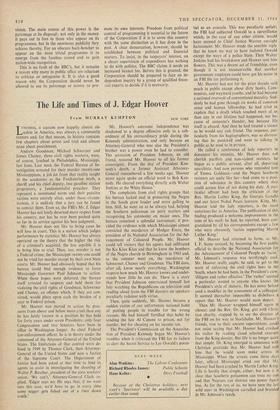Too Much Licence
By RALPH BETTINSON
IT was good to learn from its Annual Report that 'for BBC Television 1963 was a year of fruition and 1964 a year of fulfilment.'
After successful litigation the Corporation has recovered some £21 million of back income tax on the previous surplus of licence income and • shows a deficit of £868,135 on the year's working. We are now going to be asked for an increase
• in the broadcasting receiving licence. The familiar arguments will be advanced : that per capita the Briton pays less for his radio and television than any other European citizen; that there has been no increase in the licence fee since 1957—or 'for nearly ten years,' as the BBC prefers to express it. These facts are true, but as arguments they are false. What really counts is the total moneys made available to the Corporation to run its services. This sum is enormous.
As recently as October, 1963, it was given an increase in revenue. Up till then, £1 from the total £4 Of the licence had gone to the ' Treasury. After that date the BBC received the entire amount. This meant an increase in its yearly income of some £12-1 million, or nearly enough to cover the £13 million cost of the Television Centre. Though his licence fee had not been raised, it was the taxpayer who paid.
Today, with some 13,000,000 TV licence- holders, the Corporation's income approaches £52 -) million and is still increasing as more licences t are -sold. Wireless and television may cost the individual only Is. 6d. a week, but it costs the ,country £1 million.
`) Prior to the parliamentary debate last January on the revised Charter, the Corporation circulated :some fifty closely-typed pages to Members. The cost could not have been large, but public money was being used to lobby for. legis- lation to make this same public pay out more. In some quarters this request was not well received, one Member maintaining that he did not think the Corporation had any justification to ask for more. If it couldn't run its business on £55 million a year, there must be something Wrong with the administration and it 'should be firmly reminded of that fact.'
This rebuff will not deter the BBC from re- Peating its demands. Its second television pro- gramme has necessitated considerable outlay and it has a rooted objection to raising money for capital expenditure by borrowing. Not for it the normal methods of running a business. When finally driven to seek a loan, it only agreed under protest and with the air of a maiden aunt entering a pawnshop for the first time.
Although its money comes from the public, it often appears reluctant to explain in detail what It has done with it all. This became particu- larly apparent at the hearing of the Committee of Public Accounts in 1962.
At that time it was pointed out that the Cor- Poration receives additional revenue from the sale of radio and television programmes to other countries. The publie has paid the original cost of these, but it is never told how much these sales total. The Corporation's Accounts show an item of expenditure: 'Artists, speakers, perform- ing rights, news royalties, etc.' The Committee Was told that such additional revenue was credited to this. These sales should represent valuable exports, but, for all the public knows, the programmes may be given away.
It also came out at the same hearing that the Corporation had, quite legally of course, set aside some £495,000 of public money for what it pessimistically described as 'a contingent liability for staff.' On inquiry this turned out to be for the creation of a pension fund.
Even such items as 'Fixed Assets' are not all that they appear to be. These are always shown in the Accounts at cost. Thus, in spite of soar- ing values, the land on which Broadcasting House and the Television Centre now stand are included at the figure paid for it many years ago. More- over, it is difficult to discover exactly how many leaseholds and freeholds the Corporation does own. They are not completely listed in the Accounts, the Handbook or even the telephone directory. In short, the Committee clearly demonstrated that the BBC Accounts do not present a true picture of its enormous assets.
'You do not contemplate,' one Member asked the Director-General, 'having a valuation of your freehold and leasehold assets to see how you stand in fact in relation to the figures given in your accounts?'
To which the Director-General replied, 'We have not done so, sir.'
Whatever this meant, the public who paid for all this land originally still does not know what it is worth today, although another year's accounts have now been published.
It is too late to question the reasons why the charge of providing a third television chan- nel became the burden of the taxpayer instead of private enterprise. Without doubt It was an unfortunate decision, for it has already proved an expensive undertaking which has so far failed in its purpose—to provide programmes that a reasonable-sized audience would be so interested in watching that they would buy a television set capable of receiving them.
There is, however, a much more serious aspect of this failure. A large number of people depend for their livelihood on the manufacture and sale of television sets. Due to the uncertain technical future while the Pilkington Commission took a
'Well, hold the damn thing
year longer than expected to produce its famous report, there had been a slump in sales. The entire industry was looking to BBC-2 to remedy this situation.
The Corporation had deliberately sold every- body on the idea that it needed a second channel to give the public a balanced diet and that it could do great things if only it were granted. What followed when it got the second channel was disastrous. The public was first regaled with some inept and coy propaganda about 'kan- garoos' and 'custard' and then there emerged from the mountain a mouse which certainly did not roar. In consequence, the expected boost in the sale of television sets has not materialised.
When the representative of the set manufac- turers remonstrated to the Corporation about the poor quality of the programmes on the new chan- nel, he found out that it did not share his point of view. It seemed to think that it was doing a good job. In fact, Sir Hugh Greene is reported to have told his critic that it was ridiculous to worry about this kind of thing during the summer months and to have suggested that he come back if the sales had not improved by Christmas.
If the Corporation had been wise it might have been warned by the example of the second pro- , gramme in Germany. There the Zweites Deutsches Fernsehen has run into financial diffi- culties due to over-confidence and extravagance, and is consequently encountering considerable difficulty in obtaining a bigger share of the licence fee.
In Italy, too, there is a second programme from which the BBC might have learnt a different lesson. In recent months Radio Televisione Italiana has been strongly attacked for the high administrative costs of its service. In its annual report, which was published in most of the daily press, it answered this criticism by comparing its operation with the BBC's. It gave the follow- ing figures of the resources and personnel of the two Corporations:
BBC RAI
2nd programme • inaugurated .. April 20, 1964 Nov. 4, 1961 TV subscribers. 12.768,313 4,368,773 Licence fee .. £4 £5 14s. Od.
(£1 3s. Od. must also be paid for radio) Employees .... 18,940 9,277 Total income .. £46.89 million £43.69 million as of March 31, as of Dec. 31, 1963 1963 Apparently this was a low estimate, for the Corporation's recent Annual Report gave a higher figure of 19,722 full-time and 1,114 part-time em- ployees. Even by comparison with the Italian figures it would certainly seem that the BBC should have done better with the resources and personnel at its disposal. One reason for its lack of success may well be the fact that 441 per cent of its expenditure for television is on administrative ex- penses. This is something which the various unions of the writers, actors and technicians have constantly deplored. They believe that a higher percentage of the expenditure shoidd be allocated to the programmes themselves. This may be so, but, as was illustrated by the encoun- ter with the set manufacturers, the BBC has never taken kindly to criticism. As a Member of Parliament once said : 'One of the most disturb- ing features of the BBC is the arrogance with which it treats anyone who seeks to take issue with it on any point.'
In recent years the power of the BBC has been increased greatly by the advent of tele-
vision. The main source of this power is the patronage at its disposal: not only in the money it pays out in fees to those who appear on its programmes, but in the enormous publicity they achieve thereby. For an obscure back-bencher to appear on the most trivial programme is to emerge from the faceless crowd and to gain nation-wide recognition.
This is no fault of the BBC's, but it remains a reason why many in public office are reluctant to criticise or antagonise it. It is also a good reason why the Corporation should never be allowed to use its patronage or money to pro- ro-
mote its own interests. Freedom from political control of programming is essential to the future of the Corporation if it is to serve this country with the same distinction as it has done in the past. A clear demarcation, however, should be established between political and financial matters. To insist, in the taxpayers' interest, on a closer supervision of expenditure has nothing to do with politics. The BBC claims it needs an increased licence fee. Before this is granted, the Corporation should be prepared to face an in- dependent inquiry by a group of qualified finan- cial experts to decide if it is necessary.





























 Previous page
Previous page